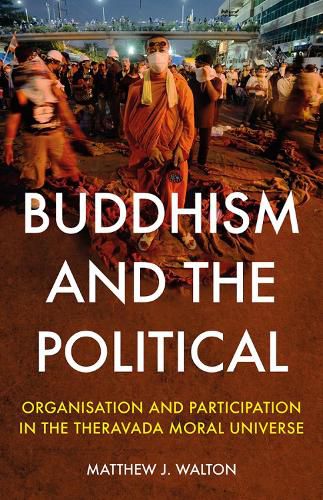Readings Newsletter
Become a Readings Member to make your shopping experience even easier.
Sign in or sign up for free!
You’re not far away from qualifying for FREE standard shipping within Australia
You’ve qualified for FREE standard shipping within Australia
The cart is loading…






Popular participation is one of the hallmarks of modern politics. So why have democracy and democratic norms generally failed to take root in the Theravada Buddhist countries of South and Southeast Asia? This book explores traditions of Buddhist political thought in Sri Lanka, Myanmar, Thailand, Laos, and Cambodia. Matthew Walton considers each country's trajectory towards independence, the controversial issue of monastic political engagement, the influence of other political forces, and persistent attempts to restrict participation, even in contemporary democratic states. He also contextualises this landscape within the Theravada Buddhist arguments for and against greater political participation, probing the dualistic understanding of human nature that questions ability to self-govern while valuing moral improvement through free action. Secular rationales in favour of democracy are unlikely to be effective unless they consider the logic of the Theravada moral universe. To move forward, South Asian democracy supporters must not only heed Walton's assessment of the region's politico-religious nexus, but also engage with the fundamental ambivalence he identifies in Buddhist perspectives on the legitimacy of mass participation.
$9.00 standard shipping within Australia
FREE standard shipping within Australia for orders over $100.00
Express & International shipping calculated at checkout
Popular participation is one of the hallmarks of modern politics. So why have democracy and democratic norms generally failed to take root in the Theravada Buddhist countries of South and Southeast Asia? This book explores traditions of Buddhist political thought in Sri Lanka, Myanmar, Thailand, Laos, and Cambodia. Matthew Walton considers each country's trajectory towards independence, the controversial issue of monastic political engagement, the influence of other political forces, and persistent attempts to restrict participation, even in contemporary democratic states. He also contextualises this landscape within the Theravada Buddhist arguments for and against greater political participation, probing the dualistic understanding of human nature that questions ability to self-govern while valuing moral improvement through free action. Secular rationales in favour of democracy are unlikely to be effective unless they consider the logic of the Theravada moral universe. To move forward, South Asian democracy supporters must not only heed Walton's assessment of the region's politico-religious nexus, but also engage with the fundamental ambivalence he identifies in Buddhist perspectives on the legitimacy of mass participation.